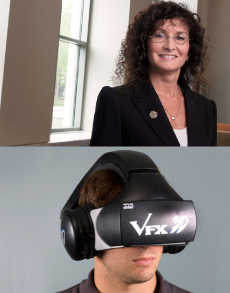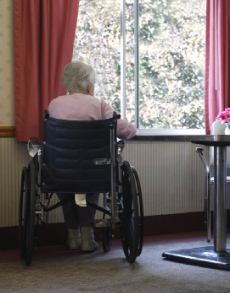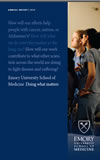In the community: Helping those in need
Ask a medical student at Emory, and he or she will tell you that the word on the street is this: Emory is not the place for you unless you’re interested in serving those who need help the most.
| In this section |
Emory faculty, students, and residents work in varied ways to serve the underserved, both close to home and far away. Whether they are caring for patients at the publicly owned Grady Hospital, helping local high school students become interested in a science career, or packing up their expertise and energy to ease suffering in Haiti, helping the community is what they’re all about.
As Georgia unemployment rates and lack of health coverage continued to exceed those elsewhere in the nation, Emory physicians provided almost $50 million in charity care last year through Emory Healthcare. They provided another $23 million in uncompensated care at Grady Memorial Hospital, Atlanta’s safety net hospital for indigent patients, where Emory medical faculty provide 85% of care (the other 15% provided by Morehouse School of Medicine).
In past years, Grady had been threatened with closure. More recently, however, new leadership and financial support from the community—including a substantial debt reduction thanks to Emory—started paying off. For the first time in many years, Grady is now operating in the black. Emory and Grady have been engaged more closely in the public health system’s strategic planning, including negotiating new contracts as a framework for mutual growth.
Last year, Emory faculty member Charles Moore established the Healing Community Center not far from Grady. The free clinic operates in three small rooms at the City of Refuge, an Atlanta nonprofit that serves almost 20,000 meals a month and provides transitional housing, job training, and other services in the Bankhead area. With a number of partners, including Grady and Emory, Moore is working on a clinic expansion expected to quintuple patients served, to 5,000, in the first year.
Emory faculty and trainees help in free clinics like this one and in a downtown Atlanta sliding-scale clinic founded by an alumnus. They also take their skills and compassion to places like Haiti, where an Emory group travels twice a year as a part of Emory Medishare, a student branch of Project Medishare for Haiti. When the Haiti earthquake occurred this past January, many from Emory were quickly on the scene.
Neurosurgeon Nick Boulis, for example, packed OR instruments along with mosquito nets and flashlights and began working just hours after arrival. By his fifth day, he had become chief medical officer for a big field hospital. Emergency medicine resident Mark Fenig quickly found himself in charge of 60 patients in cramped quarters. By the time he had to leave, he had trained his interpreter to be a medical assistant to run a mini-clinic he had set up to do patient intakes. Medical students Gabe Wardi (class of 2011) and Greg Staeheli (class of 2010) encountered medical challenges on a scale few first-world professionals ever see. At Emory, they would have checked with a resident at every stop; in Haiti, they drew on their training, which proved invaluable.
Economic engine
Since the early 1990s, Emory has brought the state more than $788 million in licensing revenues from drugs, diagnostics, devices, and consumer products. A recent report by the Science Coalition, called “Sparking Economic Growth,” highlighted four of Emory’s 51 start-up companies as national success stories, illustrating the power of federal investments in basic research. Emory companies highlighted developed the AIDS drugs now taken by more than 90% of all U.S. HIV-positive patients on therapy, promising preventive and therapeutic HIV vaccines in clinical trials, and cardiac imaging software.
 |
Helping veterans with PTSDBarbara Rothbaum, director of Emory’s Trauma and Anxiety Recovery Program, was involved in creating Virtual Vietnam exposure therapy in partnership with Georgia Tech and the Department of Veterans Affairs. Virtual Vietnam laid the groundwork for Virtual Iraq and other applications. Recently, she was part of a two-day seminar to teach mental health clinicians from the Department of Defense how to use such therapy to treat post-traumatic stress disorder (PTSD). She is also a co-investigator in an NIH trial at Emory on virtual reality (VR) therapy for returning Iraq/Afghanistan military personnel with PTSD. VR therapy uses a helmet to recreate traumatic experiences. |
|||
 |
Addressing abuse of the elderly and disabledIn a first-of-its-kind collaboration, Emory’s Wesley Woods Center and the Office of the DeKalb County Solicitor-General have established a program called VALARI (vulnerable adults living at risk invisibly) to help elderly and disabled adults find safe shelter from harm, receive care for possible injuries, and if necessary, be moved to an appropriate temporary living environment. Possible victims identified by police or fire rescue are assessed in their residences by a VALARI team member and, if appropriate, taken to Emory University Hospital’s emergency department. At Wesley Woods Center, these victims receive comprehensive medical care for the treatment of their injuries and are provided safe shelter until a more secure living situation is obtained. VALARI team member Tom Price is chief of medicine at Wesley Woods Geriatric Hospital. |
|||

